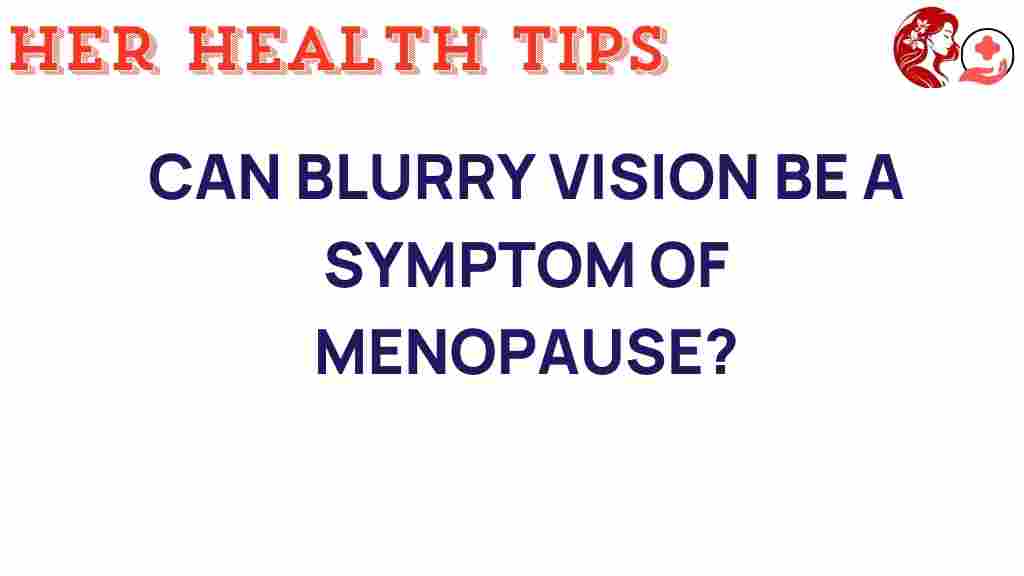Unraveling the Mystery: Can Blurry Vision Signal Menopause?
As women navigate through various life stages, they often encounter a myriad of physical changes that can sometimes be perplexing. One such change that frequently raises questions is the relationship between blurry vision and menopause. Understanding how hormonal fluctuations during this transitional period can affect eye health is essential for women’s health awareness. In this article, we will explore the connection between blurry vision and menopause symptoms, delve into the underlying factors, and provide valuable insights for managing vision problems during perimenopause and beyond.
The Link Between Blurry Vision and Menopause Symptoms
Menopause is a natural phase in a woman’s life, typically occurring between the ages of 45 and 55, characterized by the cessation of menstrual cycles and a decline in reproductive hormones such as estrogen and progesterone. These hormonal changes can lead to various menopause symptoms, one of which may include blurry vision.
Research has shown that women may experience vision changes during perimenopause, the transitional phase leading up to menopause. The decline in estrogen levels can affect the tear glands and alter the ocular surface, leading to discomfort and visual disturbances. Here are some common menopause symptoms associated with eye health:
- Dry Eyes: Reduced tear production may result in dryness and irritation.
- Blurry Vision: Fluctuations in hormonal levels can lead to temporary changes in vision clarity.
- Increased Sensitivity: Hormonal changes may heighten sensitivity to light, causing visual discomfort.
Understanding Hormonal Changes and Their Impact on Eye Health
During perimenopause, the body undergoes significant hormonal shifts that can impact various systems, including the eyes. Here are some key points to consider regarding hormonal changes and eye health:
- Estrogen’s Role: Estrogen plays a vital role in maintaining eye health, particularly in regulating tear production. A decrease in estrogen levels can lead to dry eyes and visual disturbances.
- Vision Problems: Hormonal fluctuations can cause temporary changes in the shape of the cornea, leading to issues such as blurry vision.
- Aging and Eye Health: Aging itself can contribute to vision problems, making it essential to distinguish between age-related changes and those related to hormonal transitions.
Step-by-Step Process: Identifying Blurry Vision During Menopause
If you are experiencing blurry vision as a potential menopause symptom, it’s crucial to approach the situation methodically. Here’s a step-by-step process to help you identify and manage your symptoms:
Step 1: Monitor Your Symptoms
Keep a journal to track when your blurry vision occurs. Note any accompanying symptoms, such as dry eyes, headaches, or sensitivity to light. Documenting your experiences can help you identify patterns and triggers.
Step 2: Consult a Healthcare Professional
Schedule an appointment with an eye care specialist or your primary care physician. Discuss your symptoms and any other menopause symptoms you may be experiencing. A comprehensive eye exam can rule out other underlying conditions.
Step 3: Explore Treatment Options
Your healthcare provider may suggest various treatment options to alleviate your symptoms, including:
- Artificial Tears: Over-the-counter lubricating eye drops can help relieve dryness.
- Prescription Medications: In some cases, medications that address hormonal imbalances may be recommended.
- Vision Correction: If your blurry vision is persistent, consider discussing options for corrective lenses.
Step 4: Lifestyle Adjustments
Implementing certain lifestyle changes can also help improve your overall eye health:
- Stay Hydrated: Drink plenty of water to maintain hydration and support tear production.
- Eat a Balanced Diet: Incorporate foods rich in omega-3 fatty acids, vitamins A, C, and E, and antioxidants to support eye health.
- Protect Your Eyes: Wear sunglasses to shield your eyes from harmful UV rays.
Troubleshooting Tips for Managing Blurry Vision During Menopause
While navigating the changes that come with menopause, it’s important to take proactive steps to manage your vision problems. Here are some troubleshooting tips to consider:
- Regular Eye Exams: Schedule routine eye exams to monitor your eye health, especially during perimenopause.
- Limit Screen Time: Reduce the amount of time spent on screens and take regular breaks to minimize eye strain.
- Practice Good Hygiene: If you wear contact lenses, ensure they are cleaned and stored properly to avoid irritation.
- Consider Hormone Therapy: Discuss with your healthcare provider whether hormone replacement therapy (HRT) is appropriate for you, as it may help alleviate some menopause symptoms.
Conclusion: Embracing Health Awareness During Menopause
Understanding the connection between blurry vision and menopause symptoms is essential for women’s health. As hormonal changes occur during perimenopause and menopause, it is vital to remain vigilant about eye health and overall well-being. While experiencing vision problems can be concerning, recognizing the potential link to hormonal fluctuations can empower women to seek timely medical advice and appropriate treatment.
By adopting a proactive approach that includes monitoring symptoms, consulting healthcare professionals, and making necessary lifestyle adjustments, women can effectively manage their eye health during this transitional phase of life. Remember, your vision is an integral part of your health, and embracing health awareness can lead to a more comfortable and fulfilling experience during menopause.
For more information on women’s health and menopause, you can visit this resource. Stay informed and empowered as you navigate this significant life transition.
For those looking to connect with others experiencing similar changes, consider joining a support group or community forum. Sharing experiences and tips can provide additional comfort and insight on managing menopause symptoms.
This article is in the category Reproductive and created by HerHealthTips Team
